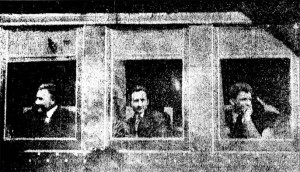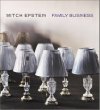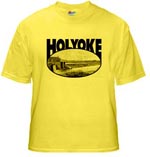by Laurel | January 5th, 2012
On 03 January 1920, in a raid prompted by Attorney General A. Mitchell Palmer and the Red Scare, 27 people were arrested in Holyoke (1 woman — the ONLY woman amid the Holyoke-Springfield-Chicopee raids –and 26 men) in connection to their alleged leftist and anarchistic activities. Of this group, 18 men and one woman were sent on to Springfield for interrogation and then placed on a special train to Boston for more interrogation and possible deportation. This article describes a little bit about the scene that day. A little lengthy, but well worth the read. I’ll try to get all the Holyoke names online later today. You can read more about the paranoia Palmer Raids here.
05 January 1920
51 Men and One Holyoke Woman
Relatives Get Little Chance to Say Goodbye
Authorities Spirit Whole Group Away for Deportation Hearing at Capital
Russians Sing Siberian Farewell
Police Station Resounds with Song Both Glad and Plaintive Before Automobiles Rush Captives to “Soviet Car” on B and A Train
The government moved quickly yesterday in disposing of suspected “reds” taken in the raid in this city and nearby places by special agents of the department of justice Friday night by speeding 52 to Boston. After weeding out the 89 prisoners who were taken in the raids in this city and Chicopee, the department released all but about 33, who were sent, with 18 from Holyoke, to Boston yesterday afternoon for further examination before the United States immigration officials. This action precedes the final deportation of all those of acknowledged or proved membership in the communist or communist labor parties and those of extreme radical views. There were 51 men and one woman in the “red” special that left Springfield.
The federal agents worked almost continuously since Saturday morning examining the men and finally completed their work yesterday morning. During the early morning hours a large number of those who established citizenship claims or who repudiated communism were released and two were allowed their freedom after furnishing bonds of $10,000 each. The two persons for whom bail was furnished were Miss Ida Evalevski of 59 Church Street and Harry Schwartz of 31 Allendale Street, Springfield. Dr. Maurice Slutskin and Levi Ginsberg furnished bonds for Miss Evalevski and Nathan Traft, Benjaman Superman and wife, Leza Felman and Bertha Felman furnished bonds for Swartz.
Bustle and Tears at Police Station
The police station presented a bustling scene during the morning hours. Numbers of relative of the prisoners came to the station to make inquiries about them. The federal agents refused to allow the prisoners to communicate with anyone. Several of the wives of the prisoners accompanied by small children appeared at the desk and pleaded with the officers to allow them to communicate with their husbands before they were taken away.
“Sorry,” was the reply of the desk officers. “This is a federal affair and we have absolutely no jurisdiction. You must see the federal officers/” The federal officers, however, were either busy sorting out the names of the prisoners or were trying to get some sleep after a strenuous tour of 34 hours continuous duty.
Russians Sing Siberian Farewell
The Russians, for the most part, expressed very little regret over their prospective deportation. Their songs, mostly Russian folk songs, were started by a song leader to be joined in by their number in all parts of the lockup. This continued intermittently until about 11 o’clock when a sudden silence filled the lockup and detention room. This continued briefly until it was broken by a rich tenor voice singing a Russian farewell song. This song, which tradition says was sung by political prisoners on the eve of the exile into Siberia, found passionate expression at the lips of the tenor. Even the staid officers on duty at the desk dropped their pens and listened in silence. The singer sang three verses of the song an then stopped. For a moment there was quiet and then thunderous applause expressed approval of the singer’s efforts. Again he burst into song, throwing even greater effort into the verse he sang in encore.
It seemed that the song carried the message of their impending departure. There was occasional singing after that, but it lacked the volume and spirit of the previous songs. The federal officers who had snatched a few hours sleep, returned to the station soon after 1 o’clock and busied themselves until nearly 2 o’clock, in making a final examination of the records of the men. Five men were released just previous to the departure of the men for the railway station.
That Liberty Bond
About 1:30 o’clock, a Pole, who hardly spoke a word or English, came to the station and inquired for his brother.
“What do you want?” the federal agents inquired abruptly.
“I want my brother. He got $50 Liberty bond and $20 that belong to me.” he said brokenly.
“Com around tomorrow. No time to look up the matter now,” replied the federal agents. The Pole departed.
Among the five men who were released was Anthony Wesisky, and in the collection of stuff in the property bag was his brother’s $50 Liberty Bond and $30. He folded the bond carefully, tucked it into his pocket book and asked the desk officers in an off-handed way:
“My brother here?”
“You bet your neck your brother was here,” they said encouragingly. “Anthony” smiled a sickly, sheepish smile, just chuck full of significance and departed to meet the worried brother.
Not Very Desperate Looking Lot
It was not a very desperate looking set of travelers that set out for Boston with faraway Russia as their possible destination. They appeared happy on the whole, although one man was crying. A curious and largely unsympathetic crowd surrounded the “soviet car” and laughed and sometimes jeered at the occupants thereof. Among the spectators, however, were several relatives and friends of the voyagers and two women held up babies to wave a “last farewell” to father and husband. One father, apparently a mild, kindly Russian, kept smiling happily until the end, and his little child, all unconscious of what it was about waved a vague goodbye.
A day coach on the siding at the east end of the south station, afterward attached to the 3:35 train for Boston, held the suspected “reds.” Its occupants for the most part looked the type of the ignorant, although not a vicious foreigner. One or two intellectual faces were to be seen with a hint of idealism and fanaticism upon them. Outside the crowd of about 100 peered eagerly at “those reds.” “Back to Russia” was heard more than once. Few inside or outside of the car appeared to take the situation with much seriousness, although some spectators remarked with some feeling that it was a good thing to see the travelers leaving.
Crowd Stares at Woman Prisoner of Holyoke
Mrs. Anna Rodowsky of 379 Park Street, Holyoke, the only woman in the party sat near the rear of the car, separated by several seats from the rest. As soon as she arrived in a touring car with Mr. Butterworth and other federal agents, and entered the car an inquisitive group surrounded the window, Standing on the station platform and on a baggage truck. Mrs. Rodowsky is an attractive looking middle aged woman with a rather intellectual face and appeared tired before this prying scrutiny. Finally the window shade was pulled down and she was relieved of a part of the ordeal.
Friends of the car occupants bought cigarettes and these were taken to the prisoners by federal agents. The car was guarded on all sides by federal officials and those who attempted to come close to the car in an effort to converse with those inside were shoved back. Conversation was maintained, however, by means of signs and smiles. Many of the prisoners were smoking and sandwiches and coffee were given them by their captors. Jacob Feldon sat unconcernedly nest to a window and appeared to enjoy the scene.
William Bawarowsky, one of those taken in the Holyoke raid was for a time secretary of the local industrial workers of the world organization.
Station Crowd doesn’t Notice First Group.
The first occupants of the “soviet car” part of the Holyoke prisoners arrived from the police station where that had just been rushed from Holyoke at 3:40. None of them arrived in the first patrol load, and they were escorted in a group by federal agents and police officers to the car. Their arrival passed unnoticed by the station crowd although further along on the platform about 75 people were waiting for the 2:32 for New York, which was late.
When another patrol arrived with 12 more of the suspected “reds” the crowd became aware that something unusual was going on and flocked up to watch the proceedings. Thereafter each batch of prisoners had a large audience as it left the patrol and entered the car. The last prisoner embarked before 5 o’clock. Four loads of prisoners arrived, the last two trips of the patrol carrying 14 and 15 captives, respectively. Two or three patrolmen accompanied each load and quickly hustles the prisoners the 75-feet journey to the car. The Holyoke men came in the first two trips and the suspected “reds” from Springfield and Chicopee furnished the remainder of the voyagers.
The first batch of prisoners were hurried to the car in a group. The next and last loads were formed in columns of twos and thus marched to the car. The other load was dispatched two at a time, accompanied by a patrolman. The 3:35 for Boston was about a quarter of an hour late in the station. About 20 minutes previous to the arrival of the Boston train, the special car had pulled out in the yards to wait. As soon as the Boston train arrived the car was attached to the front of it and a few minutes later pulled out for Boston. About half of the captives friends remained to see their final departure. Practically all remained smiling until the end.
Chance for Revolution in the Car
About eight federal officers accompanied the 51 prisoners to Boston, and it would apparently have been an easy thing for the men to stage a revolution in the car. But their seemed to be no danger of this. Most of the captives appeared docile and tranquil. As the “soviet car” passed out of Springfield federal officers were passing coffee in paper cups among the passengers.
Are These Innocent?
It was learned yesterday that while the raid was made on Liberty Hall a meeting of the Paole Zionists was being held to hear Leon Schorr, who had served with the British army in Palestine, discuss Zionism in Palestine. Among those at the meeting were Nathan Schulman, teacher in the Hebrew Free School, Talmud Torah, and Norris Pevzener, a local printer, secretary of the independent workmen’s circle, a sick and death benefit association with hundreds of members among the Jews in Springfield. Both men, their friends say, were in no way connected with the communist movement. Harry Schwartz, who was released under bonds, is a painter and was one of those caught in the raid on the painters’ social club in Victory Hall. His friends claim that he was never connected with the communist part or had any sympathy with the extreme radicals.
Train Bent This Man’s Bail
A last minute effort was made to secure the release of Mr. Pevzener under bonds. John L. Rice, United States Commissioner, who served as bail commissioner, had arranged to accept bonds. When the federal agents were asked to produce him, it was found that he had been taken to the station. It was arranged, however to have bonds for his release on his arrival in Boston.
Hard on Milan Ivanoff
Among those who went down on the “red” special was Milan Ivanoff. This young man, a Bulgarian, was employed as a janitor at Wesson maternity hospital. He had been a student at the International College and when his funds ran low accepted a position at the hospital. About two months ago, the young man was induced to join the socialist part,. While it was stated that he was a student of Marxian socialism, he was said to be entirely ignorant of the communist party’s aims and had never had membership in the organization. He was earning money to take a course in electrical engineering at Massachusetts Institute of Technology. An electrical engineer of this city, who is well acquainted with the young man and who was interested in him, stated that Ivanoff was a student of socialism but was not an extreme radical. He was seized at the hospital early Saturday morning.
United States Agent Condemns Employer for Firing This Man
Abraham Mazer, proprietor of the Standard Paper and Merchandise Company of 52 Taylor Street, was severely scored by Special Agent R. N. Butterworth, in charge of the local district for the department of justice, for the discharge of Leon Schorr, the young Zionist who was the speaker before Paoll Zion on the night of the raid. Schorr was a salesman for Mazer, having been in his employ two weeks. Mazer stated that when he learned that Schorr has been arrested he did not know how long he would be kept in custody and promptly filled his place with another man. Agent Butterworth told Mazer that there was no excuse for Shorr’s discharge.
“You should have reserved judgment,” said Mr. Butterworth, “until after he had examined him; You have done the man an injustice.” Mr. Mazer admitted that he had probably acted hastily.
More to Be Released in Boston
It was generally believed yesterday that about half of the contingent who were sent to Boston would be released after they had been examined by the immigration officials. Several of the men who were sent to Boston are citizens, who, it is claimed, were not members of the communist part, others, who are not citizens, are reputed to be opposed to the communist theory.
The plans for sending the men to Boston were made with the utmost secrecy. Outside of the federal agents and officials of the police department on duty at the time, the fact did not become known until the loaded patrol wagons were driven hurriedly though the streets.
Adapted from The Springfield Republican.
Read more about the Palmer Raids.









